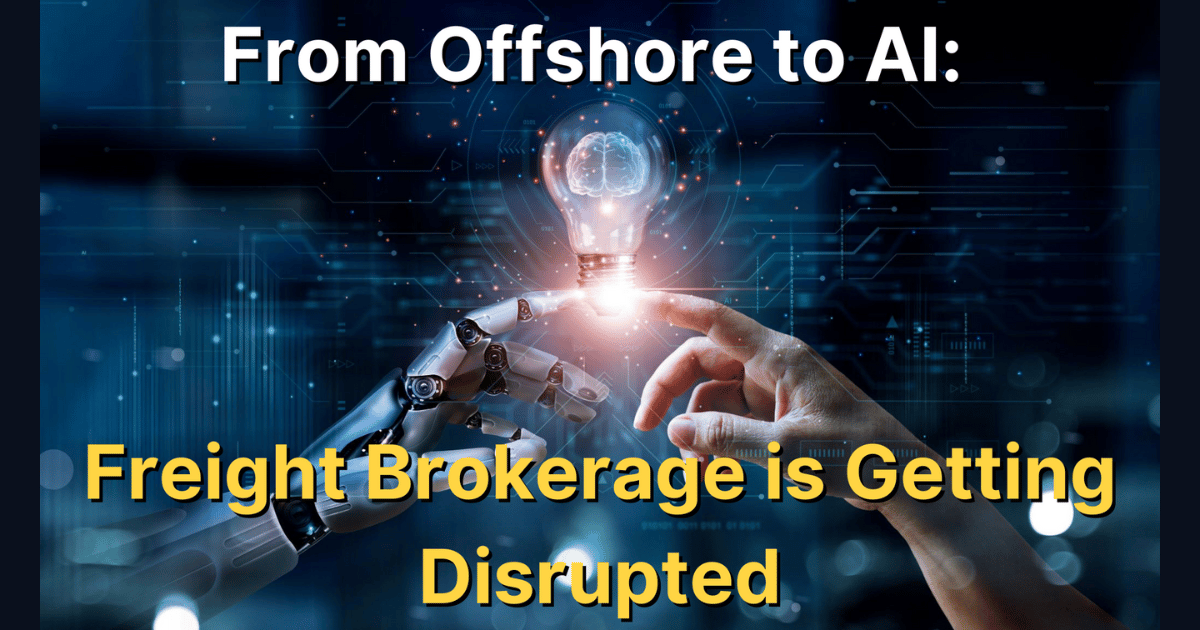- Let's Talk Logistics
- Posts
- From Offshore to AI: Freight Brokerage is Getting Disrupted
From Offshore to AI: Freight Brokerage is Getting Disrupted
Artificial intelligence isn’t politely waiting at the dock—it’s here, and it’s about to upend how freight brokerages, supply chains, and the industry at large operate.

For an industry built on the movement of goods, logistics has historically been slow to move on innovation.
But artificial intelligence isn’t politely waiting at the dock—it’s here, and it’s about to upend how freight brokerages, supply chains, and the industry at large operate.
AI Has Arrived in Logistics
Some might dismiss this as hyperbole, but consider this: the same skepticism surrounded robotics in warehouses. Fast forward to today, and you’ll find fewer workers on the floor and smarter, more efficient systems running the show.
Still unconvinced? Look at the headcount at CH Robinson—a company forced to adapt to shifting market dynamics and efficiencies enabled by technology.
If robotics and automation were the tremors, AI is the earthquake—and it’s coming for freight brokerages next.
How AI Will Reshape Logistics Operations
AI isn’t a shiny new toy; it’s a workhorse ready to transform how logistics operates.
Think about all the repetitive tasks that bog down brokerages: managing invoices, reconciling freight claims, tracking shipments, and communicating ETAs to customers. These are ripe for automation.
Savvy logistics companies will use AI to:
Predict better outcomes: Automate load planning and carrier selection for the best cost vs. speed balance.
Scale smarter: Enable U.S.-based employees to handle more work, faster, without sacrificing quality.
Elevate customer service: Use AI insights to anticipate problems before they arise and provide proactive solutions.
The result? Not just leaner operations, but happier customers—and let’s face it, in logistics, that’s the ultimate goal.
Companies like Happy Robot have even figured out how to automate carrier sales reps…and it’s actually really impressive! Marc Andreesen doesn’t invest in companies that aren’t pushing the boundaries of what’s possible—a move which signals that AI-driven logistics is worth watching.
Why Offshore Models Should Worry
Companies like Lean Staffing have long offered freight brokerages an affordable offshore staffing solution. But what happens when AI can do the same job more efficiently—and without the overhead?
The offshore model thrives on cost-effectiveness and scalability; AI beats it on both counts. AI doesn’t take sick days, doesn’t require benefits, and doesn’t clock out.
Freight brokerages can use AI to automate the roles they’d normally outsource, while their U.S.-based employees focus on strategic, high-value tasks.
The impact? Offshore staffing won’t disappear overnight, but its dominance in logistics will fade as AI replaces the need for those roles altogether.
Elon Musk’s AI Breakthrough: Proof That Disruption Has Just Begun
If you think today’s AI models are the peak of innovation, think again; Elon Musk has just redefined what’s possible with AI development.
While industry titans like Meta, Google, and Apple believed that 32,000 H100 chips represented the upper limit of supercomputer scale, Musk shattered that ceiling.
In just 19 days—an operation that normally takes four years—Musk’s team set up 100,000 NVIDIA H200 chips, creating the largest and most powerful AI supercomputer in history.
The result? A machine capable of training Grok 3, a next-generation AI model that could be an order of magnitude more powerful than GPT-4 Pro if scaling laws hold true.
This isn’t just about raw compute power. Musk’s achievement underscores the power of first principles thinking. By questioning long-held assumptions and rethinking the architecture of AI training, he achieved what the world’s most advanced developers thought was impossible.
Why does this matter for logistics?
It matters because it proves that the AI models transforming industries today are just the tip of the iceberg.
If Grok 3 delivers even a fraction of its potential, the rate of AI disruption will accelerate exponentially. What’s considered cutting-edge today will feel outdated tomorrow.
For logistics companies, this is a wake-up call. The systems and processes you rely on now are already being outpaced by AI’s rapid evolution.
Whether it’s automating freight claims, optimizing routing, or scaling operations without adding headcount, AI is no longer an option—it’s the inevitable future.
It’s Already Happening… Most just don’t realize it yet
Let’s not sugarcoat it: AI is going to replace jobs in logistics. It’s inevitable.
BUT it’s also an opportunity. For freight brokerages willing to adapt, AI offers a way to streamline operations, reduce costs, and build resilience in a volatile market.
For those who think AI won’t touch logistics, here’s a reality check: it already is. Robotics have redefined warehousing. Automation has reshaped customer service. And freight brokerage is next.
The logistics companies that survive and thrive will be those that lean into this disruption, adopting AI to future-proof their operations. The ones that don’t? They’ll be left behind, wondering where it all went wrong.
Closing Thoughts: What’s Next?
AI is no longer a distant idea; it’s here, reshaping the logistics landscape in real-time. The question isn’t if it will disrupt freight brokerages—it’s how prepared you are when it does.
So, what’s your move? Double down on legacy systems and offshore staffing, or embrace AI as the force multiplier that will keep you competitive in the next decade? The clock is ticking.